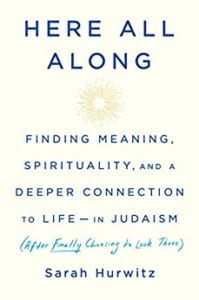Confession time: I’ve been writing poetry all year.
It wasn’t a deliberate pandemic project. In fact, poetry is pretty much the one type of writing that I was sure I’d never try because I’m definitely not a poet. But here I am all the same.
It came about entirely by accident. I was supposed to write an essay for a public-facing volume of heretical Jewish responses to the pandemic and the general state of the world. My plan was to write something on the impact of majority languages on the liturgy of minority religions or, more specifically, how King James’ language about God creeps into Jewish liturgy simply because that’s the language we have, and how that impacts how we think theologically. I couldn’t pull my thoughts together, though, and just started playing around with some texts. What would it look like, I asked myself, if the medieval Hebrew poets of al-Andalus, my guys, who quote constantly from the text of the Bible, had to be translated with that kind of English? What started as an experimental retranslation turned into a mistranslation, which turned into some original composition. I sent four texts off to the editor with a note assuring her that there would be no hard feelings if she didn’t want them because it was a first attempt at a new form, because I’m not a poet, and, let’s be honest, because they’re weird. She did want them, in the end, and the book is slated to come out next week.
I’ve barely wanted to *translate* poetry in the past when I’ve had to for academic publications because you have to be a poet to translate poetry and I’m not a poet. But, as I said, here I am all the same.
I’ve continued playing in verse with overlapping questions of poetry and biblical language and day-to-day usage, with an eye toward what I hope will become a full length manuscript of texts I’m calling mistranslations, that hew more and less closely to the book of psalms and its commentaries through the ages. It has been a pleasure to play with language in new-for-me ways and to be able to express ideas and make arguments in shorter but no lesser forms. I’ve especially been enjoying the possibilities for expressing the surreal and the non sequitur that are a part of my experience of the world but that I’m never quite sure how to explain or what to do with.
There’s lots of new technical learning to be done, and also how to navigate a completely different world of publishing. I’ve got lots of submissions in process (which means I’m constantly refreshing my Submittable), some rejections, some successes . I’m also in the process of shopping around a short chapbook manuscript based on what I’ve written this year, but I think I jumped the gun a bit, that there’s more for me to learn about expectations and submissions and the non-writing side of writing poetry. I’m revising and writing more for a stronger chapbook manuscript, and continuing to work on the longer-term project that kicked this all off in my head.
And I’m continuing to take classes and workshops here and there for practice, and exposure to new (which for me means non-medieval) forms, critique, and community. I’d been toying for a while with the idea of pursuing an MFA, which I always thought would be in creative non-fiction, but I feel like I’ve thrown into question my own writerly identity and, more importantly, the kind of work I want to do.
I’m lucky that my academic life happens in a department that has a really strong creative bent and that I don’t have to work to hide this from my immediate colleagues. But most of the academy isn’t like that, and so it’s something I’ve wanted to play pretty close to the vest until I could at least show some results of the type that are recognizable in that world (publications, a short list for a prize, etc.).
And the fact of the matter is that I’m as surprised as anyone. I’m not a poet. I’ve just been writing some poetry, and as much as when I say that sentence in my head it always ends with an audible question mark, I think I’ll keep at it for a while.



